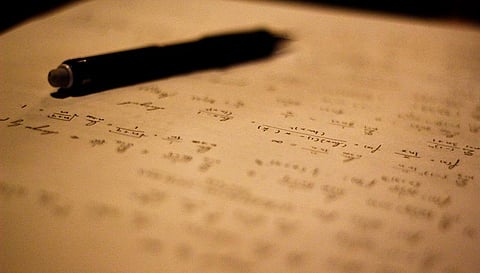
- Home
- न्यूजग्राम
- India
- World
- Politics
- Entertainment
- Culture
- Lifestyle
- Economy
- Sports
- Sp. Coverage
- Misc.
- NewsGram Exclusive
- Jobs / Internships

Manchester, September 14, 2017 : For years, Sir Isaac Newton and the German philosopher Gottfried Leibniz have been acclaimed globally for inventing the mathematical system around the end of the seventeenth century. The debate had been rife for decades over the invention of calculus.
However, British researchers finally settled this centuries-old debate in early 2007. A team from the Universities of Exeter and Manchester had asserted in 2007 that the true credit for the invention of calculus lies with the 'Kerala School of Astronomy and Mathematics'.
A little known group of scholars and mathematicians from fourteenth century India, the Kerala School are believed to have identified the 'infinite series'- one of the basic components of calculus circa 1350- 250 years before the invention was wrongly attributed to Sir Isaac Newton and Gottfried Leibniz.
The research team, led by Dr. George Gheverghese Joseph had also affirmed that the fourteenth century school of Indian scholars also discovered the Pi series, and were the first to use it to calculate Pi correct to 9, 10, and later 17 decimal places.
The beginning of modern mathematics is usually understood as a European achievement. However, the work of thinkers and mathematicians from the Kerala School is believed to have been completed two centuries before the invention of calculus in Europe.
Several studies prove that Bhaskara II (1114-1185 AD) was an eminent Indian astrologer and mathematician who 'discovered calculus' in its proto-form. However, he is believed to have failed in understanding the utility of his knowledge which is why historians of mathematics largely ignore his achievements.
The Kerala School of astronomy and mathematics flourished in the 14th and 16th centuries and was founded in Kerala, South India by Madhava of the Sangamagrama, who expanded on Bhaskara's work and advanced the progression of calculus in India.
A.K Bag had previously suggested in 1979 that this mathematical knowledge might have been transmitted to Europe through trade routes from Kerala by the traders and Jesuit missionaries. His understanding was not backed by any direct verification.
However, the researchers from England, led by Dr Joseph in their thesis published in 2007 had revealed that there exists strong anecdotal evidence that suggests that the Indians shared their mathematical knowledge, inventions and discoveries with Jesuit missionaries.
The Jesuit missionaries, who made voyages to India during the fifteenth century, were equally mathematically knowledgeable and well-versed in Malyalam and other local languages. Drawing on these lines, Dr Joseph in his findings suggested that the Indians must have thus, shared mathematic knowledge with them.
The researchers further contested that this knowledge may have been eventually passed on to Newton, who has been since wrongly attributed in books world over for this discovery.
The study drew attention to the fact that the discoveries of numerous non-Western scholars, especially the discoveries from medieval India between the fourteenth and sixteenth century remain largely ignored or forgotten till date.
Arabic and Indian scholars are known to have made discoveries before the 17th century that are now a part of calculus. However, they were not as able and Newton or Leibniz to combine their knowledge to derive a holistic thesis and turn calculus into the problem solving tool that we use today, which is why they remain largely disregarded.
Sir Isaac Newton. Wikimedia
In their 2007 study, Dr Joseph had rightly asserted that this revelation should not diminish Newton or Leibniz. Instead, it should draw attention and appraisal to the non-European thinkers whose contributions are yet to see the light of the day.
He had also revealed that thinkers from the Kerala School, most notably Madhava and Nilakantha must also be recognized and "should stand shoulder to shoulder with Newton" for their invention of the infinite series, also known as the power series.
Dr Joseph had revealed in his findings in 2007 that there exist multiple reasons why the contribution of the Kerala School had never been acknowledged. According to him, a primary reason could be the neglect credited to scientific thinkers and ideas originating in the non-European world, which could be largely attributed to colonialism.
Another chief reason why this information remained undiscovered has been attributed to the limited knowledge of Malyalam, the local language of Kerala, in which most of documentation of these influential texts of the time was written.
Dr George Gheverghese Joseph, who himself hails from Kerala, had made the findings while researching for the then-unpublished third publication of his best-seller The Crest of the Peacock: the Non-European Roots of Mathematics.
The book titled A passage to infinity — Medieval Indian Mathematics from Kerala and its Impact was later released in 2011.
It had been revealed that this new finding was not aimed at discrediting Newton. Instead, it was intended to place the Western civilizations into a more accurate historical context and place credit where it belongs.
In an interview with The Telegraph in 2014, Dr Joseph had said that the West has now recognized the contribution of the mathematicians of the Kerala School. Subsequently, certain concepts relating to the trigonometric series that were previously known as the Newton, Gregory and Leibniz series have now been renamed as the Madhava-Newton-Gregory and the Madhava-Leibniz series respectively.
NewsGram is a Chicago-based non-profit media organization. We depend upon support from our readers to maintain our objective reporting. Show your support by Donating to NewsGram. Donations to NewsGram are tax-exempt.
Click here- www.newsgram.com/donate
